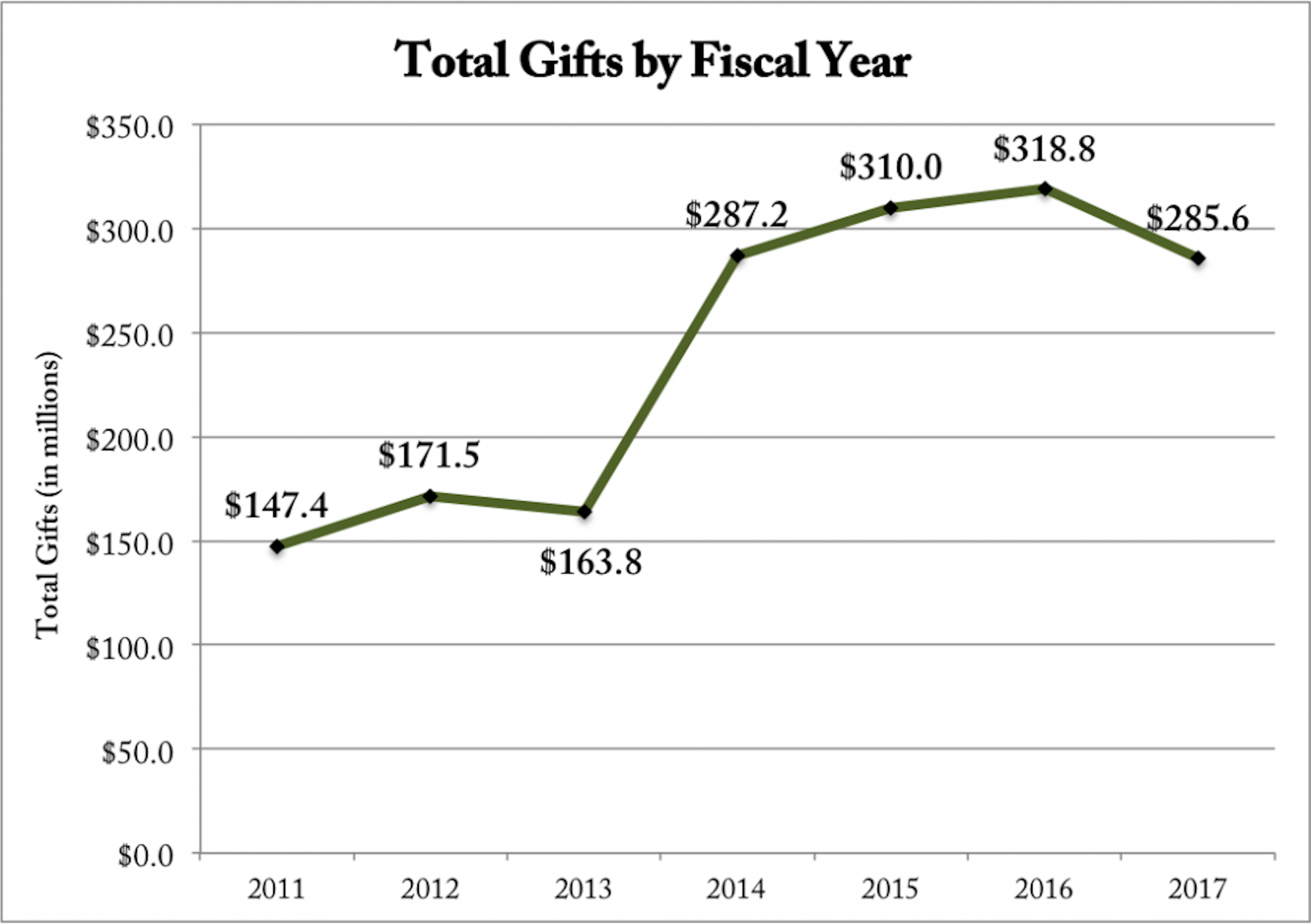In the fiscal year ending on June 30, the College received more than $285.6 million in donations and commitments, a 10.4 percent decrease from last year’s record-setting total of $318.8 million.
The new gifts will go toward supporting the athletics program, renovating new facilities and funding faculty research, among other initiatives, senior vice president of advancement Robert Lasher said. The advancement division of the College engages with Dartmouth alumni to solicit support for the College through philanthropy. The Arthur L. Irving Family Foundation and individual Irving family members also donated $80 million to launch the Arthur L. Irving Institute, while alumni and friends contributed $33 million towards the total institute goal of $160 million.
Until this year, giving totals had increased each year since fiscal year 2013. In 2015, gifts totaled $310 million, up from $287.2 million in 2014 and $163.8 million in 2013.
Over the past three years, the athletics department has received approximately $27.5 million in endowments, including a $5 million gift from Barbara and Ed Haldeman ’70 endowing the athletic director’s position.
“We have a budget that includes college subvention money, annual giving and endowment funds that cover our budget in general, and these funds free up the budget money that then can be used for something else,” athletics director Harry Sheehy said.
This year, the athletics department received a $2 million donation from Stacy Smith Branca ’94, the majority of which “enhanced” the women’s soccer program, including endowing the women’s soccer head coach position, Sheehy added.
In addition, this year’s alumni gifts have provided support for the Dartmouth faculty by funding new courses, trips to conferences and research, according to Lasher. The funds also endowed seven professorships. Lasher added that the endowments have also enabled the College to continue supporting foreign study programs and renovate the Hood Museum of Art. In March, the College announced that Frank Guarini ’46 pledged to donate $10 million to the Frank J. Guarini Institute for International Education to fund foreign study opportunities. The College also received $40.6 million toward the $50 million goal for the reconstruction of the Hood Museum. The museum is expected to be 50 percent larger, provide three times more object-study spaces for students and house five new galleries when it reopens in 2019.
In the coming year, $43.8 million, which was raised by alumni through the fundraising efforts of the Dartmouth College Fund Committee, will go towards providing financial aid and scholarships, Lasher said. The Dartmouth College Fund Committee annually organizes a fundraiser that invites every alumna to support the College. A portion of this gift will go towards the Centennial Circle of Dartmouth Alumnae, a group of female alumni in the Dartmouth College Fund Committee that provides need-based scholarships for undergraduate women, he added. Lasher noted the importance of these donations because he said creating a diverse, talented, global and socioeconomically varied student body is crucial to the College.
Executive director of DCFC Sylvia Racca A&S’13 said Dartmouth alumni are passionately driven to make the College experience accessible to as many students as possible.
“We feel that the ability for Dartmouth to enlist the support of the alumni asks for us to often understand and meet them where they are and it’s not one-size-fits-all proposition,” Lasher said. “Philanthropy could be a very personal decision, and giving to Dartmouth can be done in the way that is right for each alumni.”
Dartmouth was named the top college in the U.S. on the 2017 Forbes Grateful Grads Index. Matt Schifrin, managing editor of investing, markets and personal finance at Forbes and creator of the index, said he based this index on two categories: median donation per student and alumni participation percentage.
The median donation per student, which has a 75 percent weight in determining the ranking, divides the total alumni gifts by the number of students to equalize out small schools versus large schools. The alumni participation percentage carries a 25 percent weight and calculates the percentage of alumni that donate each year.
Schifrin said the index seems to favor small liberal arts colleges regardless of their income, since their graduates have deep affection for their undergraduate experience. He added that Dartmouth has continued to be ranked top one or two in recent years due to its “small size” and “great alumni network.”




